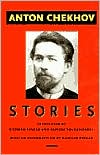| Reading Angel |

One of Anton Chekhov's most renowned love stories, Angel, in its 10-page brevity, tells the story of a young charming woman's remarkable habit of contracting happy marriages or marital unions - three in all. However, we shall err if we read Angel solely as the charming study of a kindly, simple woman whose heart overflows with love for her various spouses and the little boy whom she eventually looks after. As readers, we must also be alive, as always with this author, to contrary undercurrents, specifically contrasts between sentiment and irony. In analyzing Angel, and why she easily marries three men on different occasions, I will draw on the thoughts of Jacques Lacan.
For Lacan, an infant gains a sense of self, as it sees and contemplates its reflection in the mirror. This concept has come to be known as "The Mirror Stage". Our sense of self comes from out in the world- our awareness of ourselves is obtained through identification:
"We have only to understand the mirror stage as identification...but the important point is that this form situates the agency of the ego, before its social determination, in a fictional direction..."
This postulate has implications beyond the literal mirror - we see ourselves reflected through an entire web of social networks. People become drawn to others because they are attracted to how they are identified/reflected in relation to those specific individuals. We begin to develop a personality/subjectivity through this process of identification.
Lacan's concept of the mirror stage is brightly illumed in Chekhov's Angel. The story opens with the story's protagonist, Miss Olga Plemyannikov, sitting in isolation brooding on the porch in her yard on a rainy day. Though this seeming sad setting is intended to gage the reader, it unfortunately foreshadows the lonely sad days that Olga will come to know all too well as her life unfolds. Olga's first attempt to counter the sad lonely days occurs when she marries Vanya Kukin, someone in the entertainment business who disdains and complains of rainy days. Olga becomes sentimental as he openly deplores the rain. Chekhov describes her inclination to him as he complains of the rainy days as love:
"Olga listened to Kukin silently and seriously, with occasional tears in her eyes, until his troubles moved her in the end, and she fell in love. He was a short, skinny, yellow-faced fellow with his hair combed back over his temples. He head a reedy, high-pitched voice, he twisted his mouth when he spoke, he always had a look of desperation. Yet he roused deep and true emotion in her. She was always in love with someone - couldn't help it."
While the above passage demonstrates Olga's sentimental side, the following passage, detailing her new identity after marriage, reveals the irony of her affections and motives.
"They lived happily after the marriage. She would sit in the box-office, look after the Gardens, record expenses, hand out wages. Her rosy cheeks, her charming innocent, radiant smile could be glimpsed, now through the box-office window, now in the wings, now in the bar. Already she was telling all her friends that there was nothing in this world so remarkable, so important, so vital as the stage. True pleasure, culture, civilization... only in the theatre were things to be had.
'But does the public understand?' she would ask. "They want slapstick..."Whatever Kukin said about the theatre and actors, she echoed.
The irony of her marriage lies in the fact that for Olga it is not a union of two individuals, rather it becomes a union that molds her into an identical form of her spouse at the expense of what Lacan would refer to as her Real. As readers we readily learn that Olga wants to identify immediately with her spouses. In identifying with them she internalizes only their views of the world, and ultimately adapts their personalities. This we notice every time she marries. As she internalizes other's world views, she is essentially shifting away from her "Real" self, thus building a gap between her own identity and the identity she internalizes. This gap becomes a sense of want, or desire that can only be fulfilled by love, hence her constant desire to love someone. However, love can not fully fill the gap, resulting in a seeming infinite longing that can lead to depression. Evidence of her sorrows are revealed as we witness how she treats the young boy, whom she looks after towards the end of the story.
We know that Olga may be mildly depressed based on how she bids the young boy good night:
'God bless you,' she would say as she bade him good night and lighted his way to the stairs with a candle. 'Thank you for sharing your sorrows with me. May God and the Holy Mother keep you'. She always spoke in this grave, deliberate way...
The above passage reveals a dark heavily suppressed conscious being projected onto the boy as one projects a Jungian shadow that was hidden away for a long time onto someone else. Olga sees in the boy everything that she would like to be, an honest open whole individual, who shares his sorrows with others. She is drawn to his innocence and "Real" wholeness, everything she has lost - the irony and tragedy of her marriages.
Chekhov's ability to draw contrasts between sentiment and irony in Angel parallels that of Tolstoy. Angel's loss of self as she continually marries reminds us of many of Tolstoy's memorable female characters. It is no wonder that Angel was one of Tolstoy's favorite works to read and probably draw from. Angel provides us with all the love, drama, and despair that a Tolstoy novel would, only it does it in 10 pages.
-O. James
© Orin James 2008